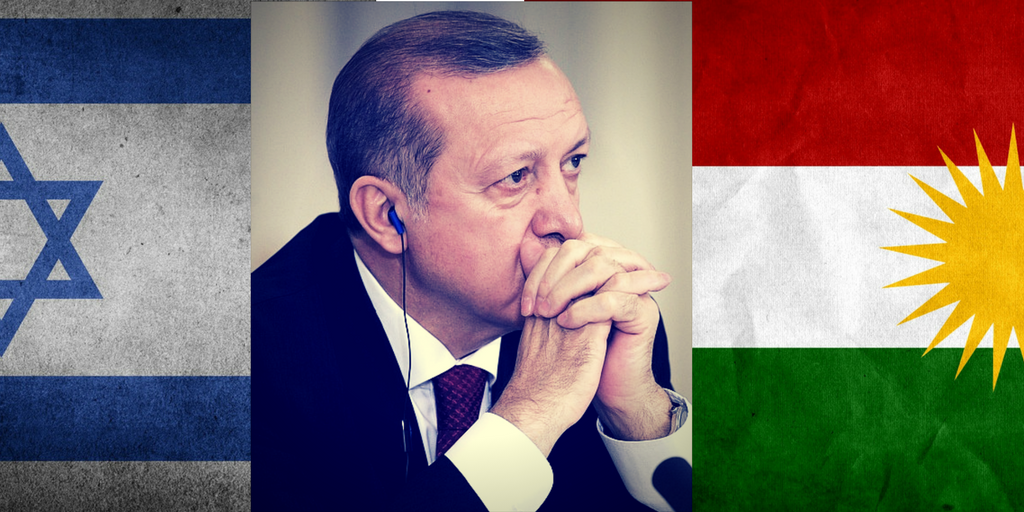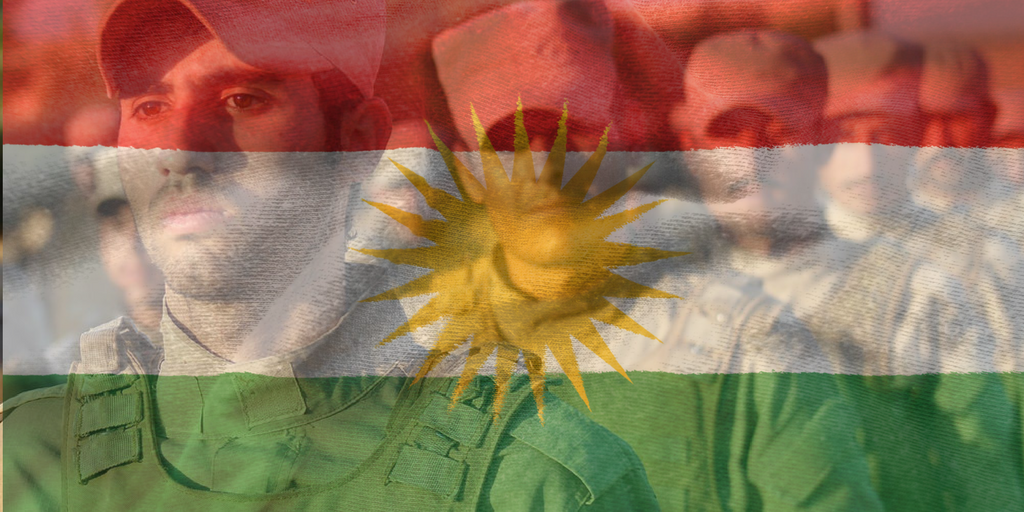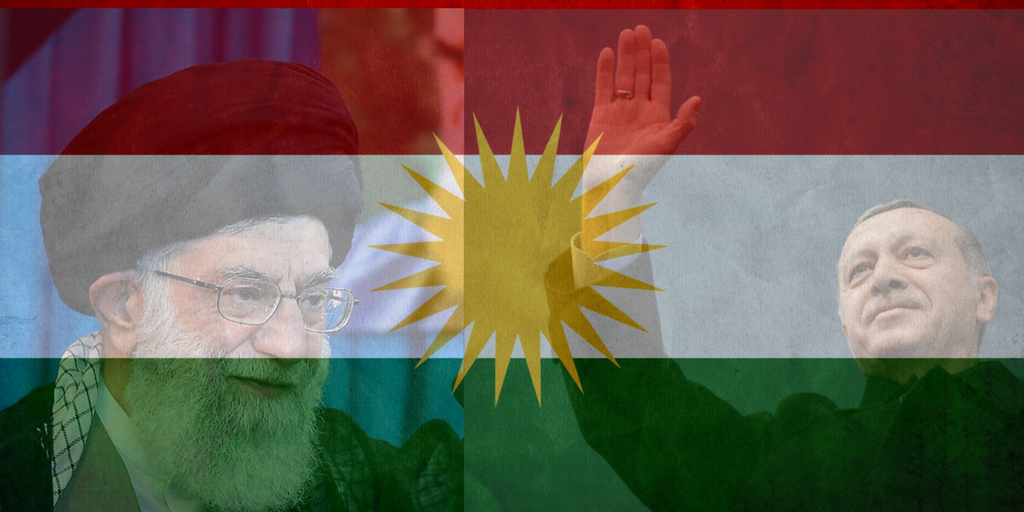If the leaders of Iraqi Kurdistan aren’t intimidated into standing down, on September 25, the people of Iraqi Kurdistan will go to the polls to vote on a referendum for independence.
The Kurds have been hoping to hold the referendum since 2013.
Whereas Prime Minister Benjamin Netanyahu restated his support for Kurdish independence earlier this month in a meeting with a delegation of visiting Republican congressmen, the Trump administration has urged Kurdish President Masoud Barzani and his colleagues to postpone the referendum indefinitely. US Defense Secretary James Mattis, who visited with Barzani in the Kurdish capital of Erbil two weeks ago, said that the referendum would harm the campaign against Islamic State.
In his words, “Our point right now is to stay focused like a laser beam on the defeat of ISIS and to let nothing distract us.”
Another line of argument against the Kurdish referendum was advanced several weeks ago by The New York Times editorial board. The Times argued the Kurds aren’t ready for independence. Their government suffers from corruption, their economy is weak, their democratic institutions are weak and their human rights record is far from perfect.
While the Times’ claims have truth to them, the relevant question is compared to what? Compared to their neighbors, not to mention to the Times’ favored group the Palestinians, the Kurds, who have been self-governing since 1991, are paragons of good governance. Not only have they given refuge to tens of thousands of Iraqis fleeing ISIS, Iraqi Kurdistan has been an island of relative peace in a war-torn country since the US-led invasion in 2003.
Its Peshmerga forces have not only secured Kurdistan, they have been the most competent force fighting ISIS since its territorial conquests in 2014.
The same is the case of the Kurdish YPG militia in Syrian Kurdistan.
As for Mattis’s argument that the referendum, and any subsequent moves to secede from Iraq, would harm the campaign against ISIS, the first question is whether he is right.
If Mattis is concerned that the referendum will diminish Iranian and Turkish support for the campaign, then his concern is difficult to defend.
Turkey has never been a significant player in the anti-ISIS campaign. Indeed, until recently, Turkey served as ISIS’s logistical base.
As for Iran, this week Iranian-controlled Hezbollah and Lebanese military forces struck a deal to permit ISIS fighters they defeated along the Lebanese-Syrian border to safely transit Syria to ISIS-held areas along the Syrian border with Iraq. In other words, far from cooperating with the US and its allies against ISIS, Iran and its underlings are fighting a separate war to take ISIS out of their areas of influence while enabling ISIS to fight the US and its allies in other areas.
This then brings us to the real question that the US should be asking itself in relation to the Kurdish referendum. That question is whether an independent Kurdistan would advance or harm US strategic interests in the region.
Since the US and Russia concluded their cease-fire deal for Syria on July 7, Netanyahu has used every opportunity to warn that the cease-fire is a disaster.
In the interest of keeping Mattis’s “laser focus” on fighting ISIS, the US surrendered its far greater strategic interest of preventing Iran and its proxies from taking over the areas that ISIS controlled – such as the Syrian-Lebanese border and the tri-border area between Iraq, Syria and Jordan. As Netanyahu warns at every opportunity, Iran and its proxies are moving into all the areas being liberated from ISIS.
And Iran isn’t the only concern from either an Israeli or an American perspective. Turkey is also a looming threat, which will only grow if it isn’t contained.
Turkey’s rapidly accelerating anti-American trajectory is now unmistakable.
Last week during Mattis’s visit to Ankara, Turkish- supported militias in northern Syria opened fire on US forces. Not only did Turkey fail to apologize, Turkey condemned the US for retaliating against the attackers.
Moreover, last week, Turkish authorities announced they are charging US pastor Andrew Brunson with espionage, membership in a terrorist organization and attempting to destroy Turkey’s constitutional order and overthrow its parliament.
Brunson was arrested last October.
Whereas until last year’s failed military coup against the regime of President Recep Erdogan, Turkey demonstrated a firm interest in remaining a member of NATO and a strategic ally of the US, since the failed coup, Turkey has signaled that it at best, it is considering its options. US generals say that since the failed coup, they have almost no one to talk to in the Turkish military. Their interlocutors are either under arrest or too afraid to speak to them.
The regime and its supporters express both neo-Ottoman and neo-colonial aspirations, both of which place Turkey on a collision course with the US.
For instance, Melih Ecertas, the head of Erdogan AK Party’s youth wing, proclaimed that Erdogan is not merely the president of Turkey, rather he is “president of all the world’s Muslims.
So, too, Muslim Brotherhood leader Sheikh Yusuf Qaradawi called Erdogan “the hope of all Muslims and of Islam.”
Qaradawi, who lives in Qatar and is Qatar’s Al Jazeera satellite channel’s superstar preacher, has good reason to love Erdogan.
In June, Erdogan decided to make a strategic move to protect the pro-Muslim Brotherhood and pro-Iranian Qatari regime from its angry neighbors, led by Saudi Arabia. Turkey’s deployment of forces to Doha stalled the Saudi-led campaign against the Qatari regime.
If the regime survives, and if world oil prices continue to drop and so weaken Saudi economic power, Turkey’s decision to deploy its forces to Qatar could be the first step toward realizing its neo-Ottoman ambitions.
As for neo-imperialism, last October Foreign Policy reported that Turkish television now uses a map from 1918 to define Turkey’s current borders. From 1918 through 1920, Turkish territory included large portions of Iraq, among them Kurdistan and Mosul, as well as large swaths of Syria, including Aleppo.
Foreign Policy reported that use of the map indicates that as the post-World War I map of the Middle East becomes obsolete, Erdogan sees an opportunity to expand Turkish territory.
Then there are Erdogan’s moves to build strategic ties with Russia and Iran.
Last November the NATO member announced it is negotiating the purchase of an S-400 air defense system from Russia.
As for Iran, last week Maj.-Gen, Mohammad Hossein Baghari, Iran’s chief of General Staff, paid the first official visit by an Iranian army chief to Turkey since the 1979 revolution. Baghari met not only by his Turkish counterpart, Gen. Hulusi Akar, but with Erdogan as well.
Erdogan said after the meeting that he and Baghari discussed possible joint military action against the Kurds in northern Iraq, Syria and Iran.
In his words, “Joint action against terrorist groups that have become a threat is always on the agenda.This issue has been discussed between the two military chiefs, and I discussed more broadly how this should be carried out.”
Baghari was more explicit. He effectively announced that Iran and Turkey will respond with force to the Kurdish referendum.
“Both sides stressed that if the [Kurdish] referendum would be held, it will be the basis for the start of a series of tensions and conflicts inside Iraq, the consequences of which will affect neighboring countries.”
Baghari continued, “Holding the referendum will get Iraq, but also Iran and Turkey involved and that’s why the authorities of the two countries emphasize that it is not possible and should not be done.”
This then brings us back to Israel and the US and why Netanyahu is right to support Kurdish independence and the Trump administration is wrong to oppose it.
So long as there is no significant change in the nature of the Iranian and Turkish regimes, their empowerment will come at the expense of the US, Israel and the Arab Sunni states.
The Kurds, with their powerful and experienced military forces in Iraq and Syria alike, constitute a significant check on both Iranian and Turkish power.
Several commentators argue that the Turks will respond to the Kurdish referendum by waging a war of annihilation against the Kurds in Iraq and beyond. Iran, they warn, will assist in Turkish efforts.
As far as Iran is concerned, in the near future, its central effort will remain in Syria. As for Turkey, whereas Erdogan and his followers may wish to undertake such a campaign, today it hard to imagine them succeeding.
A year after the failed coup, the Turkish military is astounding observers with its incompetent performance in Syria. Despite the fact that Turkish forces are fighting in Syria in areas adjacent to their border, they are unable to competently project their force.
Turkey’s underperformance in Syria makes clear that the Turkish armed forces, which Erdogan gutted in his purges of the officer and NCO corps in the wake of the failed coup, have not rebuilt their strength.
According to an analysis by Al-Monitor published last September, the first four rounds of purges in the immediate aftermath of the failed coup reduced the number of general officers by nearly 40%. The ratio of pilots to aircraft in the Turkish Air Force was reduced from more than three pilots per plane to less than one pilot per plane.
While Al-Monitor assessed last year that it would take up to two years for the Turkish Air Force to rebuild its pilot corps, last week it appeared that two years was a gross underestimation of the time required.
Last week the US rejected a Turkish request to have Pakistani pilots fly Turkish F-16s. The request owed to the critical shortage of pilots in the Turkish Air Force.
And Erdogan continues to purge his generals. In early August he sacked the commanders of Turkish land forces and the Turkish Navy.
Given the current state of Turkish forces on the one hand, and the battlefield competence of Kurdish forces, it is clear that the balance of the two forces has never been better for the Kurds.
If Kurdistan becomes independent with US and Israeli backing and survives, the implications for the longevity of the Erdogan regime, given the rapidly expanding size of the Kurdish minority in Turkey, are significant.
Likewise for Iran, an independent Kurdistan in Iraq will serve to contain Iranian power in Syria and potentially destabilize the Iranian regime at home.
In summary then, opponents of Kurdish independence are correct. An independent Kurdistan will destabilize the region. But contrary to their claims, this is a good thing. For the first time since 2009, destabilization will benefit the US and Israel and weaken Iran and Turkey.
Originally published by the Jerusalem Post.







